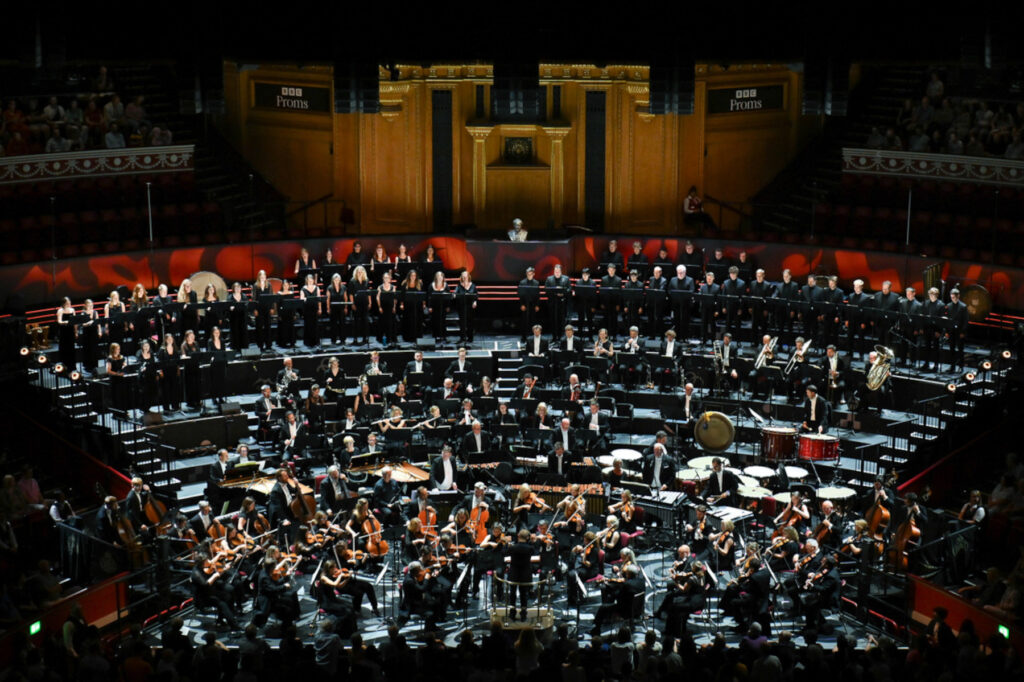Duck-quacking effects aside (in the opening work, The Boy and the Heron), this was a dark concert. Both Joe Hisaishi’s The End of the World and Steve Reich’s The Desert Music deal with themes of destruction and loss – one a response to the events of 9/11, the other directly inspired by the ‘Trinity’ test that took place in New Mexico in July 1945. Both works cajole us into looking at history as contemporaneously relevant today – and at the fragility of humanity’s survival itself.
Hisaishi’s The End of the World is not necessarily easier on the ears than another 9/11 work – John Adams’s On the Transmigration of Souls – but if it largely achieves the same emotional effect for the composer, it did not always for this reviewer: too often I found Hisaishi’s music beyond the scope of the ideas he was trying to compose for, a clash too far in some cases. Sirens (played on tubular bells) act as a kind leitmotif throughout the piece – heard at the opening of ‘Collapse’, but more persistently in ‘Grace of the St Paul’ (to symbolise emergency vehicles crossing the 9/11 site to St Paul’s Chapel). The music here is binary: a stark, almost Webern-like cello solo (Alexander Somov), contrasted with jazzy sections which highlight the urban life of New York City. The playing of the Royal Philharmonic Orchestra (especially the saxophone of Kyle Horch) was exceptionally vivid – the intensity of the prayer-like sections bordering on the atonal. ‘D.e.a.d.’, from the Skeeter Davis song, was sung with a depth of expression that bordered on the mournful by the counter-tenor John Holiday; not all diction was exact or complete, but his feeling for the words never felt unduly compromised.

‘Beyond the World’ uses a Latin chorus (the BBC Singers and Philharmonia Chorus) and diction here was woolly, too – probably in part because of the complexity of the time signature and changing harmonies which didn’t always come across clearly enough. ‘The End of the World’ fared better, with the choruses and soloist, one embracing the other, in perfect unison. Tubular bells return, to end the work in sombre peacefulness.
The End of the World struck me as an uneven work – although the performance was anything but from the RPO which was on electrifying form.
As they were also for Steve Reich’s The Desert Music. Composed in five movements – and simply given tempo markings such as Fast, Slow, and Moderate – there’s arguably something symphonic about this piece (Sibelius or Mahler most strikingly come to mind) even if Bruckner more closely fits the mould for a minimalist composer.
Reich wrote the music between 1982-84, and it has a kind of Orwellian feel to it in its element of prophecy and narrative. Reich’s longstanding fears about nuclear war, which dated back to the mid 1960s, permeate the work (as does the desert itself, the Sinai and Mojave deserts in particular). He sets poetry by William Carlos Williams in a choral setting – those words from Williams’s poems ‘The Orchestra’, ‘Theocritus: Idyl I’ and ‘Asphodel, that Greeny Flower’ acting as a warning about man’s destructiveness and his conflict with nature.
What was so haunting about this performance – and The Desert Music resonates with the melding of voice and instruments to achieve something that is rarely prosaic – was how wonderfully clear the repetitions were: in text that is deliberately concise, the music flickered with a constant precision. In the third section, the repeated canons on the word “difficult” and sustained chords sung by the choir were superb. But this was of a part: the tick-tock (reminiscent of a countdown clock) on the xylophone, the pulsing chords on the vibraphone, the violas glissando mimicking an air raid siren. “I am wide awake. The mind is listening.”, from the end of the second poem (repeated in the fourth movement), brought an almost hypnotic kind beauty from the choruses (BBC Singers and National Youth Voices).
Joe Hisaishi was attuned to the antiphonal scoring – details emerged from the orchestra (on sublime form) with gorgeous bloom, the choruses were amplified just enough, and this felt like an unqualified success. Reich’s score has lost none of its power – nor its relevance in the forty years since it was written. Through genocides, wars, famines, pandemics, and climate change The Desert Music is as relevant now as it ever was, its music still as challenging in its harmonic dissonance.
Marc Bridle
Joe Hisaishi and Steve Reich (BBC Proms 2025)
Joe Hisaishi – The Boy and the Heron – symphonic suite; The End of the World; Steve Reich – The Desert Music
John Holiday – counter-tenor; BBC Singers; National Youth Voices; Philharmonia Chorus; Royal Philharmonic Orchestra; Joe Hisaishi – conductor
Royal Albert Hall, London, 14 August 2025
All photos © Chris Christodoulou